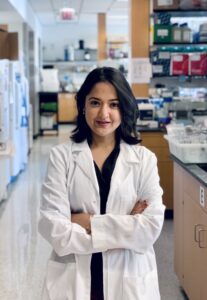Nanotechnology at Northwestern
Meet Akanksha Mahajan, a graduate student in the Stegh Lab
September 28, 2021
Akanksha Mahajan is a graduate student in the Stegh Lab, whose research program is aimed at understanding the genetic, metabolic, and immunological programs that underlie the pathogenesis of Glioblastoma multiforme, the common and malignant form of brain cancer.
 Where are you originally from?
Where are you originally from?
I grew up in a city called Thane near Mumbai, India.
Where did you complete your undergraduate and master’s degrees?
I completed my undergraduate at Bharti Vidyapeeth’s School of Pharmacy in Mumbai and then did my master’s in molecular biology at Georgetown University in Washington, D.C.
When did you first become interested in nanotherapeutics and immuno-oncology ?
I pursued pharmaceutical sciences with a dream of someday making a “magic bullet”, like the famous scientist Paul Ehrlich, to treat cancer. In targeted medicine, the “bullet” should in theory efficaciously attack pathogens, yet remain harmless to healthy tissues.
When I came across Dr. Stegh’s lab and this project, where I could build immune system-modulating DNA nanoconstructs that would target a specific pathway to exclusively kill brain cancer cells in the mouse model of glioblastoma, I was overjoyed. With my educational training in drug chemistry, biology, and my interest in cancer research, I was enthusiastic to dive into this project from the very first day.
How do you explain what you study to non-scientists ?
Glioblastoma (GBM) is one of the deadliest brain cancers. It has poor survival rates. GBM is a very “cold tumor”, meaning that it is devoid or has a lesser army of T-cells, which are the body’s major warrior cells. Current immunotherapies, which work by releasing the brakes of the immune system, don’t work for GBM tumors.
I am developing immune system-modulating DNA nanoconstructs that will re-educate the hijacked immune system around brain cancer cells to specifically kill tumor cells and improve the overall survival of the mice in our study. Through my experimentation, I have observed that just one small dose of these DNA nanoconstructs warms up the immune system for a T-cell attack on the tumor cells, resulting in complete elimination of the tumor in 60-70% of mice.
Moreover, we successfully administered these DNA nanoconstructs through an intranasal route for the first time, rather than intravenous or intracranial routes that are invasive and toxic.
Your research has explored the way that activating tumor associated immune cells can contribute to improving survival in brain tumor. What attracted you to this area, and what do you hope to achieve with your research?
Glioblastoma tumors are challenging to treat because they are inherently resistant to conventional therapy. The average survival for glioblastomas in the United States is less than two years. There is a deep satisfaction to be working on the design and testing this “magic bullet”. Someday, under my mentor’s expert guidance, I hope we can bring this DNA nanoconstructs treatment from bench to bedside.
What has been a highlight of your time at Northwestern?
A lot of things have been rewarding for me at Northwestern over the past four years. My love for my project has helped me get through really difficult times. It has helped improve my mental health and has also provided me with an empowering feeling to march on. Waking up most mornings to test a fresh idea makes my eyes sparkle like a child.
The highlight of my time at Northwestern so far was a “eureka” moment while reading about a specific structure of the DNA nanoconstructs, which in turn helped me come up with the idea of dual-targeting nanoconstructs: one pathway to decrease immune-suppression and the other to activate the immune system to fight against tumor cells.
What has been the most challenging aspect of your work or your time at Northwestern?
The pandemic has cast a dark cloud of uncertainty over all of us, which makes it the most challenging aspect of my time at Northwestern. Working in such trying times has taught me to be more emotionally resilient to worst case outcomes. It has also made me appreciate and enjoy small wins, like finishing my experiments on time, or receiving a nice compliment on my data, or fixing a broken centrifuge, and occasionally, I have learnt to treat myself to my favorite pizza just for getting through the day.
Can you tell me about your experiences either being mentored or mentoring others?
My mentor, Dr. Alexander Stegh, has always shown trust in my work and given me the freedom and independence to express and execute ideas as I see fit. His constant eagerness to learn new things that are out of the his comfort zone has definitely been crucial in the development of my project. The quality of my work keeps improving under his mentorship because he believes in setting high standards of work and research.
Dr. Stegh also has a very translational approach for every project which provides me with a sense of fulfilment that someday what we are doing as bench work can save someone’s life.
What are your hobbies outside of the lab?
I love to draw, paint, and make digital illustrations. I enjoy gardening as well. I am a nature enthusiast and try my best to travel and to be one with nature when I can. Additionally, I love to explore the city with friends and family. When I am at home, my kitchen is my experimentation lab, and putting together delicious recipes is something that brings joy to me.